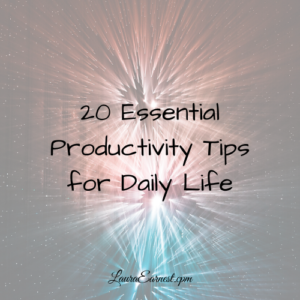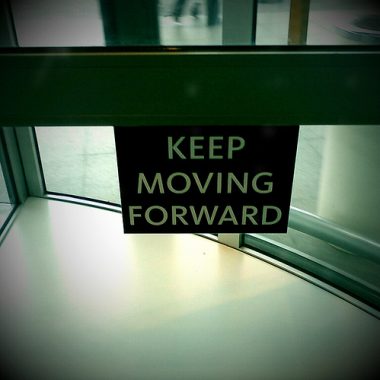
20 Essential Productivity Tips For Daily Life
Productivity is not simply just about how you do your work. Peak productivity takes into account your physical state, distraction level, energy, and organization. Today we will look at 20 essential productivity tips for your daily life.
I used to be a person who would make a list and just plow through it, regardless of how I felt, what was going on, or any other consideration. I hated the phrase “work smarter, not harder” because it seemed a wimpy way out. But there is a lot to be gained from working smarter, and that means I have to take into account all of the areas of my life in order to hit peak productivity with minimal effort. Here are the 20 areas that go into my strategy for getting the most done with the least amount of effort.
The Essential Productivity Tips for Daily Life
- Get enough rest. If your mind or body is tired, you will not have the energy to stay on track. Rest includes sleep as well as mental breaks. Pushing through the fatigue will just lead you to make mistakes or cloud your judgement. Learn to get enough sleep and to take breaks throughout the day. I use alarms on my phone to tell me to go to bed, and the alerts on my Fitbit to remind me to take breaks.
- Watch your food intake. Your blood sugar level plays a huge role in brain fog. Eating yourself into a food coma by either quantity or type of food (leading to blood sugar spikes and crashes) works against mental clarity. Learn what food leads you to crash and avoid them. I plan my breakfasts and lunches so that they give me energy without the crashes.
- Hydrate. Water is just as important as the right type of food. And I’m not talking about water with additives like soda, coffee or tea. Plain old water can keep you flowing (pun fully intended) through the tasks by increasing your mental clarity. Learn to drink enough water every day – if nothing else, getting up frequently to go to the bathroom will give you a mental break! I keep an insulated cup at my desk and aim to empty it at least three times a day.
- Stand. Sitting is a killer. Standing aligns your body to allow air and blood to flow better, and has the added advantage of keeping you awake. Find a way to stand more while you work, whether it is a raised desk or standing during meetings. I try to emulate my client manager, who stands whenever he is at his desk.
- Move every hour. Along with sitting, it is very easy to get into a groove of staying put. Getting up and getting steps every hour can keep you from being totally sedentary, as well as give you a break. I use my Fitbit to remind me to get at least 250 steps every hour. I use trips to the break room to get more water and use the bathroom on another floor as my way to get those steps in every hour.
- Get a decent chair. Sitting hunched over or at the wrong height will make your muscles cramp up. Having pain in your body is a sure concentration breaker. Get yourself a decent chair that you can work in without pain. My writing studio chair was literally falling apart, and I had to pay attention to how I sat every time I used it so that more pieces wouldn’t fall out. A trip to the local IKEA snagged me a great chair for under $100 that allows me to forget that I am sitting.
- Watch your posture. Much like sitting in a bad chair, sitting slumped over will hurt your productivity. Curled over on yourself means that everything is cramped. Your digestion, circulation and breathing are all affected. Correct your posture either through conscious effort or by using a brace* or device. I find that standing more often along with a posture brace while I am at home helps the fatigue and muscle aches.
- Keep a distraction list handy. Distractions happen. What you do next determines your level of productivity. Making a list as it occurs to you gets it out of your head, and gives you the freedom to get back to your work. I like to keep a sticky note handy to write down the distraction so that I can get back to my task, knowing I will deal with the sticky note later.
- Use content blockers. We live in a world of online distractions. Using content blockers on your phone, computer and browser can keep you from going down the rabbit hole of whatever your favorite time sink might be. I use the built-in app limit on my iPhone, plus Freedom when I need the extra boost. On my computer, I use Leechblock on all my browsers to keep me away from timewasters like Pinterest and other social media.
- Eliminate ads. Advertising is everywhere to snag your attention. Giving your attention to advertising means you can’t give it to the task at hand. Eliminate the advertising in your life. I use an ad blocker on all my browsers (including on my phone and tablet) to eliminate them. The only television I watch live is football, and I make it a point to get up and move around during commercials. And I limit the time I spend on social media (see above) so my exposure there is limited.
- Know thyself. Every person has their own unique strengths and weaknesses. Knowing what yours are allow you to compensate for weakness and play into the strength. In productivity know what your distractions are and make them harder to get to. With your strengths, make them easier to access. I know that Pinterest will suck me in faster than an industrial vacuum. I have to take steps to limit it, or risk losing hours. I know that working from my endless lists gets things done, so I make sure I write everything down.
- Remove negativity. Negativity will suck the drive out of you. Remove yourself from exposure to it, whenever you can. This includes exposure through the media, social media, family, friends, co-workers and any other entity that does not make you feel joyful and supported. I stopped watching the news because it never fails to make me angry. I stopped social media because I don’t need to compare my life to others. And I only keep up with the friends who make me feel positive and supported.
- Don’t fret over the past. There is nothing you can do about the past. My friend Nell used to say, “you can look back, but don’t stare.” If you need to, use the example of the past to do better in the present. But don’t waste your time an energy on something that you cannot do anything about. If I find myself wanting to revisit the past, I go to a trusted friend to talk. I get it out, and don’t stay stuck.
- Don’t future trip. Living in the past is bad, but living in the future is worse. We cannot predict how the future will go. So planning how it will go is a pointless waste of time and energy. My wise friend Nell also had a saying for this: “you can do everything you can in the present, but you can’t control how it will turn out.”
- Be where your feet are. If you’re not in the past or future, you need to be where you are: in the present. Focus on what you are doing, keeping yourself on task. This also leads you into single-tasking, rather than multi-tasking. Being mindful of what you are doing can also keep you from making costly mistakes due to inattention.
- Block the noise. Noise can be a varying distraction depending on multiple factors. Some days you might be able to concentrate with a high level of ambient noise; the next the rustle of paper might put you off your game. Having a way to block the noise will make it easier to focus. I recommend active noise-cancelling headphones and a pink noise app/track*.
- Pair your tasks with energy level. We don’t have the same levels of energy throughout the day – there are peaks and valleys, and everyone is different. Learn what your peaks and valleys are, and match your tasks. Do low-level tasks like filing and answering email when you are at low energy and save the high energy times for the tasks that require focus, creativity and brain power. I routinely save administrative tasks for early afternoon and right after work.
- Vary your tasks. Doing the same task over and over can dull your brain. If you find your energy flagging because you are bored, switch up your tasks and get more done than trying to slog through. This is where I use the Pomodoro method: 20 minutes on task, 5 minute break, repeat 3 times.
- Stay on task. This may appear to be in direct contrast to the one above, and it is. There is a time for a variety, and there is a time, as I once heard, “to ride the wild donkey.” Sometimes you are on task, in the flow and fired up. Don’t let anything distract you when you are in this state. When I hit this (rare) state, I make sure I have all my distraction remedies at hand (post it notes, pens, noise blockers).
- Quit while you’re ahead. Sometimes you’re just tired. Rarely is it a good idea to try to push through the tiredness by willpower or sugar or caffeine. A break, a walk, even a short nap will do better than forcing yourself. And if you are near quitting time while at work, leave. Don’t try to force yourself to keep going past your limits. I find that when I do force myself, I always make a fairly serious mistake in my work.
- Remove the clutter. Clutter is distraction waiting to happen. Piles of things are not an organizational method, they are clutter. Piles cry out at some level to be gone through. Clear your field of vision and you will have less distraction. This applies to your desk, your bedroom and your phone. I keep the first screen on phone and tablet empty, and keep papers and decorations away from my working and sleeping spaces.
- Clear your brain regularly. Clutter gets in the way, whether physical or mental. By dumping things out of your brain regularly, you will work with a clean slate and have more bandwidth to concentrate. This can take the form of quick brain dumps for tasks and projects, or morning pages* to help you clear the webs out of your head. I like doing the morning pages, but honestly the emotional work is sometimes too hard to do first thing in the morning. For everyday stuff, I write notes in my bullet journal.
- A place for everything. One way of getting rid of clutter is to have a place for everything (and keep it there). This not only kills the distracting clutter but saves you the time of having to find things you misplaced. I never have to look for my keys because they are with my wallet. My wallet lives in a spot near the door. My phone is tied to my keys with a Tile*. I no longer spend any time searching for anything I need.
- Know what is on your plate. It is really easy to take on too much if you don’t know what you already have on your plate. And once you take on too much, it becomes a downward spiral of paying off the interest on the projects without ever getting to the principal. Knowing what is on your plate can save you from taking on more. I have a list of all my unfinished projects. If it’s not on that list, I don’t do it.
- Be aware of sunk costs. Far too often we continue to pour time and energy on projects that we know aren’t going to serve us or don’t interest us anymore. Why? Because we’ve put so much time and energy into them already. This is what is known as a sunk cost. What’s in the past is in the past and can’t be changed. Don’t take it into account when looking at the future. I had a beautiful and extremely challenging cross stitch that was on brutally small fabric. I was about a sixth of the way done with it. It was beautiful, but I grew to hate working on it. I threw it away, knowing that I would never finish it.
Conclusion
There is a lot more to productivity than just making lists and plowing through. What do you think? Do you have any items to add?



